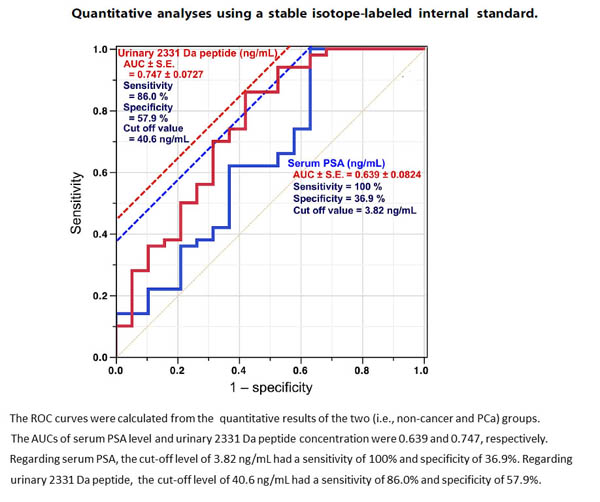BACKGROUND AND OBJECTIVES:
Prostate cancer (PCa) is one of the most common cancers and leading cause of cancer-related deaths in men. Mass screening has been carried out since the 1990s using prostate-specific antigen (PSA) levels in the serum as a PCa biomarker. However, although PSA is an excellent organ-specific marker, it is not a cancer-specific marker. Therefore, the aim of this study was to discover new biomarkers for the diagnosis of PCa.
MATERIALS AND METHODS:
We focused on urine samples voided following prostate massage (digital rectal examination [DRE]) and conducted a peptidomic analysis of these samples using matrix-assisted laser desorption/ionization time-of-flight mass spectrometry (MALDI-TOF/MSn). Urinary biomaterials were concentrated and desalted using CM-Sepharose prior to the following analyses being performed by MALDI-TOF/MSn: 1) differential analyses of mass spectra; 2) determination of amino acid sequences; and 3) quantitative analyses using a stable isotope-labeled internal standard.
RESULTS:
Multivariate analysis of the MALDI-TOF/MS mass spectra of urinary extracts revealed a 2331 Da peptide in urine samples following DRE. This peptide was identified as a C-terminal PSA fragment composed of 19 amino acid residues. Moreover, quantitative analysis of the relationship between isotope-labeled synthetic and intact peptides using MALDI-TOF/MS revealed that this peptide may be a new pathognomonic biomarker candidate that can differentiate PCa patients from non-cancer subjects.
CONCLUSION:
The results of the present study indicate that the 2331 Da peptide fragment of PSA may become a new pathognomonic biomarker for the diagnosis of PCa. A further large-scale investigation is currently underway to assess the possibility of using this peptide in the early detection of PCa.


Nakayama K, Inoue T, Sekiya S et al., PLoS One. 2014 Sep 18;9(9):e107234. doi: 10.1371/journal.pone.0107234. eCollection 2014.


